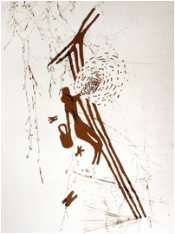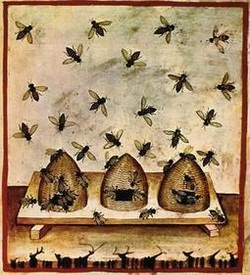Humans and bees have a fruitfully interwoven history

FROM POETS TO SCIENTISTS, A FASCINATION WITH BEES
Of all insects, bees — especially honeybees, the first animals to be domesticated — are the most lauded by humans.
Honeybees have been praised by poets and writers -- from Virgil to Shakespeare --and their colonies are seen as a metaphor for human societies. When Roman poet Virgil devoted one book of The Georgics (an epic series of poems on agricultural themes) to bees, he drew parallels between the structure of honeybee colonies and human society. In his history play Henry V, Shakespeare compares a well-run kingdom to a beehive.
More recently, many scientists have been fascinated by honey bees. For instance, nuclear physicist Eva Crane fell under the spell of bees and went on to visit more than sixty countries to study the insects, becoming one of the twentieth century's foremost bee researcher. As per Karl von Frisch, he obtained the Nobel prize in Medicine / Physiology in 1973 for his discovery and description of the honeybees' "waggle dance" (the way bees communicate to locate the best nutritional sources).
This deep-seated and anthropomorphic attitude to bees, and to honey bees in particular, stems from an ancient tradition that draws on their collective and industrious powers: socially stratified, artisanal, productive, and ... under constant threat.
HONEY: A SYMBOL OF LIFE AND WEALTH
In Greek mythology, Aristaeus -- God of apiculture -- was the son of Apollo and the huntress Cyrene. Aristaeus was born in the palaces of Libya, where nurses dropped nectar and ambrosia on his lips, turning him into an immortal. Nymphs taught him useful arts and mysteries, like how to curdle milk for cheese and tame the Goddess' bees to stay in hives.
Pre-hispanic Maya cultures produced honey from the native stingless bee (Meliponini). Honey was found in the tombs of the Pharaohs. Romans could use honey instead of gold to pay some of their taxes. Beekeeping was introduced in Bulgarian monasteries because honey and beeswax had a high economical value. Monasteries there were given golden seals by the authorities. When English colonists sailed off to Virginia, they brought honey bees along with them.
Many philosophies and religions insist on the importance of bees for both mankind and nature. The Buddha thus said, “Let the wise man live in the flower of his village, like the bee, gently taking flowers’ honey, but not harming the blossom and it’s colour and scent." Similarly, people of Islamic faith consider honey, which is mentioned in the Holy Quran, to be very precious.
The following story (recalled by the authors Dimo Dimov and Stefan Bogdanov) illustrates the intertwining of bee and Man, of legend and history, and the value of bee-made products, including for healing. The saint Haralampi (Greek Haralambos) was a Greek Christian saint from the 2nd century AC. Haralambos, persecuted very severely by the Roman emperor of that time, survived Roman tortures and helped many persecuted brothers by healing them with the use of honey, propolis and herbs. He lived until he was executed at the age of 112 years. Before his execution, Haralampi said the following prayer: “May God bless the fruit of our labour and may there be abundance of milk and honey, by which all beekeepers can make their living by caring for their harvest and for life in general." In addition to the classic "milk and honey" metaphor used to characterise a generous land, other words such as "nectar" or "honeymoon" also refer to highly positive situations.
Interestingly, honey was also used to make mead, an alcoholic drink used in celebrations made by simply adding water to honey and allowing natural fermentation to occur. Mead came before beer and wine. Mead has been drunk in most cultures, and today is very popular within African and South American tribes. The French anthropologist Claude Lévi-Strauss, in his work Du Miel aux Cendres [From Honey to Ashes], noted that every tribe in South America had their own type of mead.
Hence, from the earliest Greek poetry to the latest Hollywood blockbuster, the bee stands as an emblem of man’s relationship to nature and, ultimately, to himself. In our more secular times, the health of bee populations has become a powerful byword for ecological diversity and sustainability. The contribution that bees make to our industry and environment has become a major international concern.


